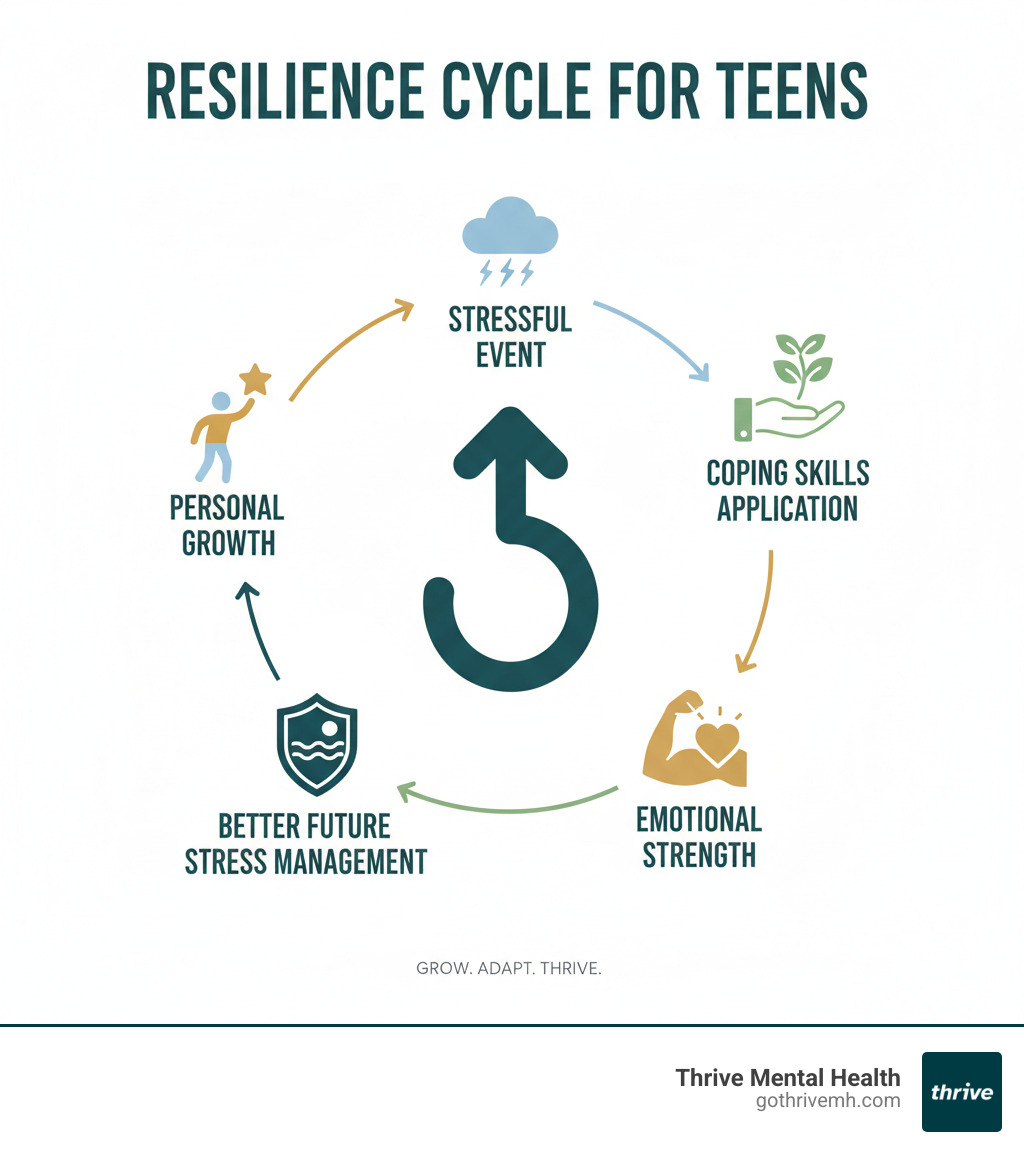How Teens Can Master Resilience and Thrive

Resilience training for teens: 7 Ways to Thrive
Why Resilience Training for Teens Matters More Than Ever
Resilience training for teens is an essential skill for navigating modern life. The American Psychological Association reports that today’s teens experience more stress than any other age group, facing academic pressure, social media comparison, and an uncertain future.
Resilience is the ability to adapt, recover, and grow from life’s challenges. It’s not an innate trait but a skill that can be taught and strengthened. It involves:
- Emotional regulation and problem-solving
- Positive self-talk
- Building strong support networks
The goal is to help teens “bounce forward” from setbacks, not just bounce back. As resilience researcher Dr. Ann Masten calls it, this “ordinary magic” comes from everyday support systems and coping skills. Resilient teens don’t avoid problems; they just have better tools for handling them.
At Thrive Mental Health, our evidence-based programs for teens and young adults focus on building these tools. We’ve seen how effective resilience training for teens can be in creating lasting mental wellness.

Quick look at resilience training for teens:
The 7 C’s: The Proven Blueprint for Resilient Teens
The 7 C’s model of resilience, a framework from the American Academy of Pediatrics, provides a clear roadmap for what resilience training for teens should include. It’s not about being superhuman; it’s about developing specific characteristics to steer life’s challenges.
Here are the 7 C’s:
- Confidence and Competence: Confidence is the belief in one’s ability to handle challenges, which grows from competence—the actual skills to steer the world. We build both by celebrating effort and letting teens solve their own problems.
- Connection and Character: Strong relationships with family, friends, and at least one caring adult are powerful protective factors. Character provides a moral compass, guiding teens with a sense of right and wrong.
- Contribution and Coping: Contributing to their community gives teens a sense of purpose and value. Coping skills are the practical tools—like deep breathing or positive self-talk—to manage stress and emotions constructively.
- Control: This is the realistic sense of agency over one’s life. Resilient teens focus their energy on what they can influence, empowering them to make choices and take responsibility without feeling overwhelmed.
At Thrive Mental Health, we integrate these seven principles into our evidence-based programs, including Virtual Counseling for Teens, to help young people build genuine strength and confidence.
7 Actionable Resilience Training Strategies for Teens
Building resilience takes practice. These seven strategies are practical tools your teen can start using today to build their mental health toolkit.
1. Master Positive Self-Talk
The voice in your teen’s head can be their biggest supporter or worst critic. Resilience training for teens teaches them to manage this internal dialogue. When a negative thought like “I’m going to fail” arises, teach them to question it. Reframing failures as learning opportunities (“What can I learn from this?”) builds a growth mindset. A simple exercise is to write down three things they did well each day.
For more strategies, see our guide on Building Resilience—Online Coping Strategies.
2. Build a Self-Care Routine
Real self-care means consistently meeting basic needs. The “holy trinity” of teen mental health is sleep (8-10 hours), nutrition, and exercise. Beyond the basics, self-care is about creating sustainable routines, like organizing their room or spending time outside. When it becomes a habit, it provides the energy to handle life’s curveballs.
For creative ideas, check out our article on Art Therapy Activities for Adolescents.
3. Practice Mindfulness & Calming Skills
In a hyper-connected world, mindfulness is a superpower. It reduces anxiety and improves emotional regulation. When teens feel overwhelmed, techniques like guided meditation or deep breathing bring them back to the present. A quick technique is the 5-4-3-2-1 grounding exercise: name 5 things you see, 4 you touch, 3 you hear, 2 you smell, and 1 you taste. Journaling also helps process emotions and gain clarity.
4. Grow Your Support Network
Resilience is not about handling everything alone. Asking for help is a sign of wisdom, not weakness. Teach teens to normalize asking for support from family, friends, and other caring adults. Research shows that having at least one trusted adult outside the immediate family significantly boosts resilience. The goal is quality over quantity.
5. Tackle Problems Head-On
Resilient teens don’t avoid problems; they develop strategies to face them. Breaking big problems into smaller, manageable steps prevents overwhelm. Encourage them to brainstorm solutions instead of providing answers. Most importantly, teach them to learn from mistakes without self-blame. The resilient response is asking, “What can I do differently next time?”
6. Set and Chase Meaningful Goals
Working toward meaningful goals provides direction and purpose. Help your teen find their “why”—what excites them or what problems they want to solve. Setting realistic short- and long-term goals creates a roadmap for growth. Celebrating small wins along the way builds momentum and reinforces their ability to succeed.
7. Know the Difference: Resilience vs. Suppression
This is a critical distinction. True resilience isn’t “sucking it up”; it’s learning to move through difficult emotions, not around them. Real resilience means feeling and processing pain, not ignoring it. Avoid toxic positivity like “just think positive.” Instead, validate their emotions by encouraging them to name what they’re feeling. The goal is to develop healthy ways to experience and express all emotions.
How Parents and Schools Can Help Teens Build Resilience

Resilience training for teens thrives in a supportive environment. While teens must develop their own skills, parents and schools create the web of support that allows them to flourish.
The Parent’s Role: Guide, Don’t Rescue
Resilience grows through manageable challenges. Your role is to be a guide, not a rescuer.
- Connect without judgment: When your teen is upset, your first job is to listen and validate their feelings. “That sounds really frustrating” is more helpful than trying to immediately fix the problem.
- Model healthy coping: Your teen learns from how you handle stress. When you talk through problems or admit mistakes, you teach them that struggling is normal and manageable.
- Let them learn from mistakes: Resist the urge to swoop in. Instead of doing their project for them, help them break it down. Natural consequences are powerful teachers. As the American Psychological Association’s guide notes, unconditional love combined with age-appropriate challenges builds resilience.
How Schools and Communities Can Support
Schools are crucial training grounds for resilience.
- Social-Emotional Learning (SEL) programs: These evidence-based curricula teach teens to manage emotions, build relationships, and make responsible decisions, leading to better academic performance and less anxiety.
- Supportive school climates: An environment where students feel connected, where mistakes are learning opportunities, and where every student knows an adult has their back is essential.
- Access to resources: Schools must provide clear access to counselors and mental health professionals, recognizing that mental health is as important as physical health.
Thrive Mental Health partners with families and schools through our Adolescent Intensive Outpatient and Partial Hospitalization Programs to provide comprehensive resilience training for teens.
Long-Term Benefits of Resilience Training for Teens

Investing in resilience training for teens provides a mental toolkit that serves them for life. Research shows these skills have lasting positive effects. The long-term benefits include:
- Better mental and physical health: Teens who manage stress effectively are less likely to develop anxiety or depression. Reduced chronic stress also leads to a stronger immune system and better overall physical health.
- Improved academic and career outcomes: The ability to bounce back from setbacks and adapt to change is highly valued in school and the workplace. Resilient individuals can handle pressure and solve problems creatively.
- Healthier relationships: Skills like empathy, communication, and conflict resolution are foundational for building deep, meaningful connections with friends, partners, and family throughout life.
- Greater life satisfaction: A resilient mindset sees challenges as opportunities for growth. This creates a life filled with more purpose, confidence, and joy.
- Lower risk of mental health disorders: Strong coping skills and emotional regulation act as powerful protective factors, building a “mental immune system” that helps prevent future mental health issues.
At Thrive Mental Health, we see these changes daily. The teens who learn resilience skills today become the confident, capable adults of tomorrow.
When to Seek Professional Support
Recognizing when to ask for professional help is a sign of strength. If your teen’s coping strategies aren’t enough, it may be time to seek support.
Signs your teen may need professional help include:
- Persistent feelings of hopelessness, anxiety, or sadness.
- Significant changes in sleep, appetite, or social behavior (like withdrawing from friends).
- A consistent drop in academic performance.
- Feeling emotionally “stuck” or constantly overwhelmed.
Therapy helps build resilience by providing practical tools. Evidence-based approaches like Cognitive Behavioral Therapy (CBT) teach teens to challenge negative thought patterns and develop healthy coping mechanisms. Therapy provides a safe space to build emotional regulation—the ability to feel emotions without being overwhelmed by them. This is the core of resilience training for teens.
At Thrive Mental Health, our virtual and hybrid Intensive Outpatient (IOP) and Partial Hospitalization (PHP) programs are designed to help teens thrive. We offer flexible, expert-led care custom to each teen’s needs.
Getting started is simple. You can Verify Your Insurance for Teen Therapy or explore our dedicated Virtual Counseling for Teens.
Insurance and Access to Care in Florida
Getting the right mental health care for your teen shouldn’t be a maze. Thrive Mental Health works with a wide range of insurance providers to make our programs accessible.
We partner with major insurers like Cigna, Optum, Florida Blue, and many others. This means your plan may already cover our virtual and hybrid IOP/PHP programs for teens.
For families in Florida, we’ve simplified the process of understanding your coverage. Our quick, no-obligation insurance verification takes just 2 minutes. You’ll get a clear, transparent picture of what your plan covers for resilience training for teens through our programs.
We believe you deserve to know your options. The process is confidential and there’s no pressure to commit.
Ready to see what’s possible? Start your benefits check—no obligation on our website. It’s the first step toward getting your teen the support they need to thrive.
Frequently Asked Questions about Resilience Training for Teens
Here are answers to common questions about resilience training for teens.
What is the goal of resilience training for teens?
The main goal is to give teens the skills and mindset to handle stress, recover from setbacks, and grow from challenges. It’s about building a mental toolkit for long-term mental health, helping them become confident, capable adults.
How does resilience training help with school, friends, or emotions?
It teaches practical, real-world tools. For school, they learn to manage projects and anxiety. For friendships, they learn communication and boundary-setting. Emotionally, they learn that feelings are manageable and develop healthy ways to express them.
Can resilience really be taught?
Absolutely. Research confirms that resilience is not a fixed trait but a set of learnable skills. With practice and support, teens can significantly improve their ability to handle stress, a concept Dr. Ann Masten calls “ordinary magic.”
What’s the difference between resilience and just “being tough”?
“Being tough” often means ignoring pain and suppressing emotions. Real resilience is the opposite: it involves feeling your emotions, processing them in healthy ways, and knowing when to ask for help. It’s about vulnerability and self-compassion.
How can parents support their teen’s resilience?
Parents play a huge role by modeling healthy coping and creating a safe, nonjudgmental connection. Validate your teen’s feelings, resist fixing their problems, and let them learn from mistakes in a supportive environment. This builds the confidence that is essential for resilience.
Suggested JSON-LD Schema:
{
"@context": "https://schema.org",
"@type": "FAQPage",
"mainEntity": [{
"@type": "Question",
"name": "What is the goal of resilience training for teens?",
"acceptedAnswer": {
"@type": "Answer",
"text": "The main goal is to give teens the skills and mindset to handle stress, recover from setbacks, and grow from challenges—supporting long-term mental health."
}
},{
"@type": "Question",
"name": "How does resilience training help with school, friends, or emotions?",
"acceptedAnswer": {
"@type": "Answer",
"text": "It teaches practical tools for managing academic pressure, building stronger relationships, and handling tough emotions with healthy coping skills."
}
},{
"@type": "Question",
"name": "Can resilience really be taught?",
"acceptedAnswer": {
"@type": "Answer",
"text": "Yes. Research shows resilience is a skill anyone can build with practice, support, and the right strategies."
}
},{
"@type": "Question",
"name": "What's the difference between resilience and just \"being tough\"?",
"acceptedAnswer": {
"@type": "Answer",
"text": "\"Being tough\" means ignoring pain. Real resilience means feeling, processing, and learning from hard times—while knowing when to ask for help."
}
},{
"@type": "Question",
"name": "How can parents support their teen's resilience?",
"acceptedAnswer": {
"@type": "Answer",
"text": "Model healthy coping, validate feelings, encourage problem-solving, and let teens learn from mistakes in a safe, supportive environment."
}
}]
}
Take the Next Step: Get Resilience Support for Your Teen Now
Building resilience training for teens is a journey, and no family has to walk it alone. It’s about giving your teen the tools and support to not just survive challenges, but to grow stronger because of them.
At Thrive Mental Health, we’ve seen countless teens find their inner strength through our evidence-based programs. Our virtual and hybrid IOP/PHP programs are designed for young people who need more than weekly therapy. We offer evening options that fit school schedules, expert-led care from licensed clinicians, and flexible formats that meet your family where you are.
We focus on practical skills your teen can use immediately, building the long-term emotional strength that will serve them for decades.
Ready for support? Getting started is easier than you might think.
- Verify your insurance in just 2 minutes (no obligation) right on our website.
- Call us at 561-203-6085 to speak with our team and discuss your teen’s needs.
If you’re in crisis, call/text 988 right now. You are not alone, and help is available 24/7.
